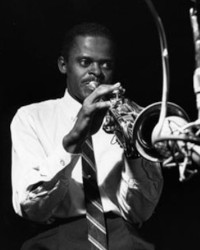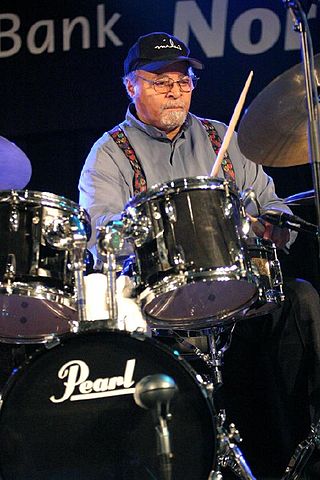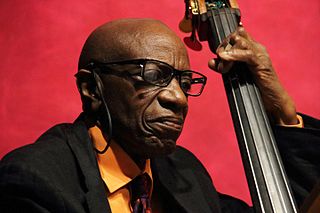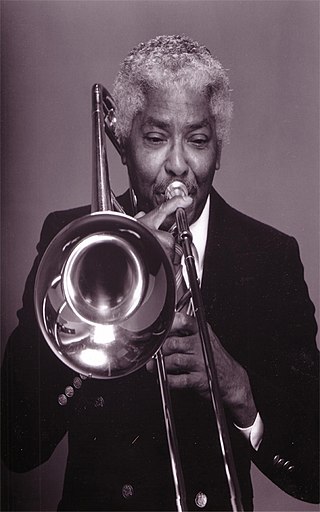
Joseph Rudolph "Philly Joe" Jones was an American jazz drummer.

Oscar Pettiford was an American jazz double bassist and composer. He was one of the earliest musicians to work in the bebop idiom.
Clifford Osbourne Jarvis was an American hard bop and free jazz drummer, who in the 1980s moved to London, England, where he spent the remainder of his career.

Arthur S. Taylor Jr. was an American jazz drummer, who "helped define the sound of modern jazz drumming".

Thomas Walter Turrentine, Jr. was a swing and hard bop trumpeter and composer who was active between the 1940s and the 1960s. He rarely worked as a bandleader, and was known for his work as a sideman with drummer Max Roach and his younger brother, the saxophonist Stanley Turrentine.

Kenneth Earl Burrell is an American jazz guitarist known for his work on numerous top jazz labels: Prestige, Blue Note, Verve, CTI, Muse, and Concord. His collaborations with Jimmy Smith were notable, and produced the 1965 Billboard Top Twenty hit Verve album Organ Grinder Swing. He has cited jazz guitarists Charlie Christian, Oscar Moore, and Django Reinhardt as influences, along with blues guitarists T-Bone Walker and Muddy Waters.

Albert "Tootie" Heath was an American jazz hard bop drummer, the brother of tenor saxophonist Jimmy Heath and the double-bassist Percy Heath. With Stanley Cowell, the Heaths formed the Heath Brothers jazz band in 1975.
Arthur David Davis was a double-bassist, known for his work with Thelonious Monk, John Coltrane, Dizzy Gillespie, McCoy Tyner and Max Roach.

Wilbur James "Jimmy" Cobb was an American jazz drummer. He was part of Miles Davis's First Great Sextet. At the time of his death, he had been the Sextet's last surviving member for nearly thirty years. He was awarded an NEA Jazz Masters Fellowship in 2009.

Reginald Workman is an American avant-garde jazz and hard bop double bassist, recognized for his work with both John Coltrane and Art Blakey, in addition to Alice Coltrane, Mal Waldron, Max Roach, Archie Shepp, Trio Three, Trio Transition, the Reggie Workman Ensemble, and collaborative projects with dance, poetry and drama.

Quentin "Butter" Jackson was an American jazz trombonist.

Julius Watkins was an American jazz musician who played French horn. Described by AllMusic as "virtually the father of the jazz French horn", Watkins won the Down Beat critics poll in 1960 and 1961 for Miscellaneous Instrument.
Britt Woodman was an American jazz trombonist.

Samuel Jones was an American jazz double bassist, cellist, and composer.

James Milton Cleveland was an American jazz trombonist born in Wartrace, Tennessee.

Charles Lawrence Persip, known as Charli Persip and formerly as Charlie Persip, was an American jazz drummer.

Sam Woodyard was an American jazz drummer.
Leslie Spann Jr. was an American jazz guitarist and flautist. As a sideman he recorded with Nat Adderley, Benny Bailey, Bill Coleman, Eddie "Lockjaw" Davis, Curtis Fuller, Red Garland, Benny Goodman, Sam Jones, Abbey Lincoln, Charles Mingus, Duke Pearson, Jerome Richardson, Charlie Shavers, Sonny Stitt, Billy Taylor, Randy Weston, and Ben Webster. As a leader he recorded only once, the album Gemini in 1961.

This is a timeline documenting events of Jazz in the year 1959.
In the late 1960s, Latin jazz, combining rhythms from African and Latin American countries, often played on instruments such as conga, timbale, güiro, and claves, with jazz and classical harmonies played on typical jazz instruments broke through. There are two main varieties: Afro-Cuban jazz was played in the US right after the bebop period, while Brazilian jazz became more popular in the 1960s. Afro-Cuban jazz began as a movement in the mid-1950s as bebop musicians such as Dizzy Gillespie and Billy Taylor started Afro-Cuban bands influenced by such Cuban and Puerto Rican musicians as Xavier Cugat, Tito Puente, and Arturo Sandoval. Brazilian jazz such as bossa nova is derived from samba, with influences from jazz and other 20th-century classical and popular music styles. Bossa is generally moderately paced, with melodies sung in Portuguese or English. The style was pioneered by Brazilians João Gilberto and Antônio Carlos Jobim. The related term jazz-samba describes an adaptation of bossa nova compositions to the jazz idiom by American performers such as Stan Getz and Charlie Byrd.















